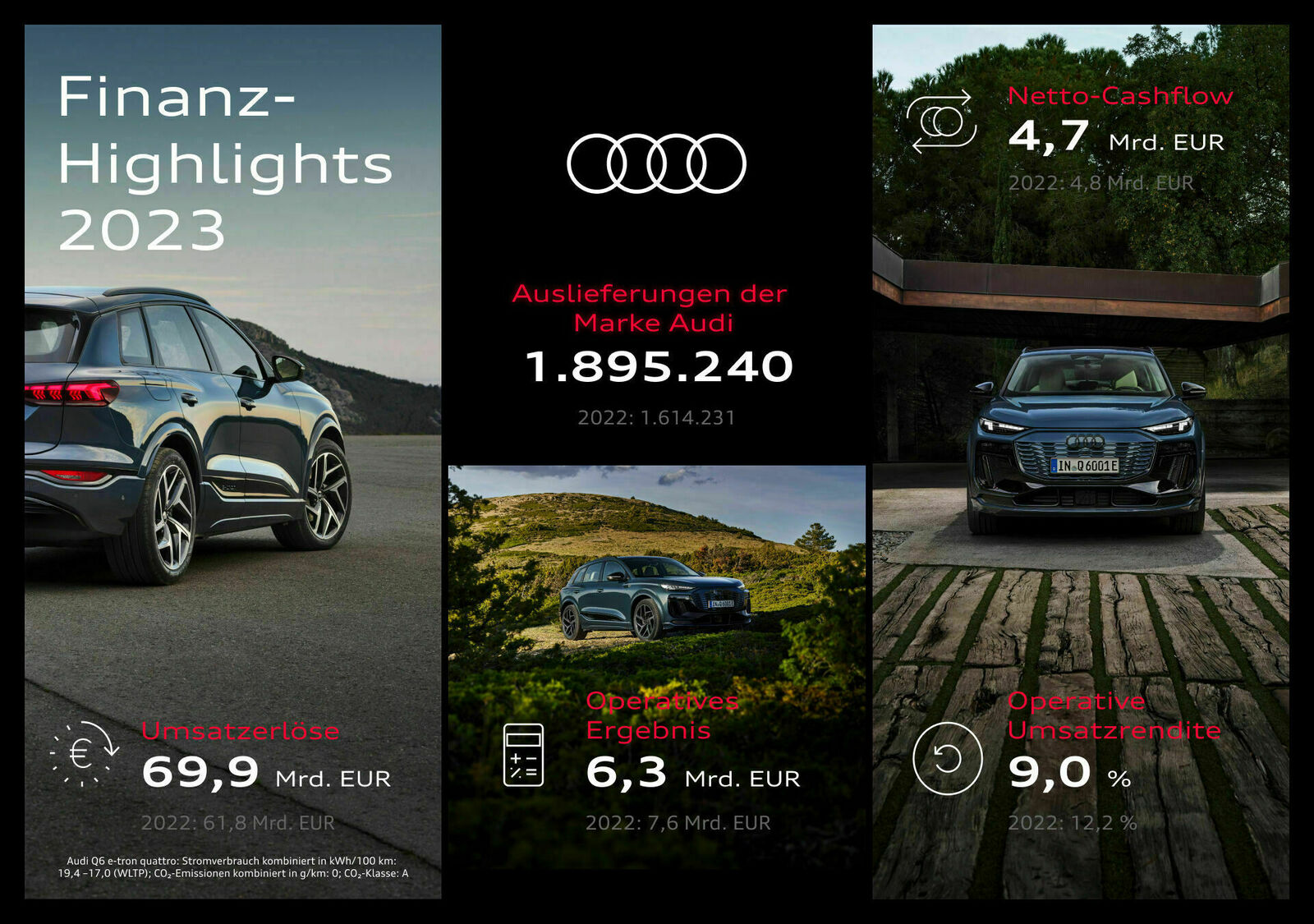“We are positioning ourselves for the future economically, technologically, and strategically, and we are putting our new products on the street one by one,” says Gernot Döllner, CEO of AUDI AG. “The basis is a binding agenda focused on our key areas of activity: financial performance, excellent products, and a flexible and agile corporate structure. In this way, we are accelerating the transformation in a challenging economic environment.”
Deliveries: growth in all core regions
Within the Audi Group, Audi, Bentley, Lamborghini, and Ducati pool their expertise in the Brand Group Progressive. In fiscal year 2023, the brand group delivered 1,918,912 (2022: 1,638,638) cars and 58,224 (2022: 61,562) motorbikes to customers. With deliveries of 1,895,240 cars, the Audi brand achieved an increase of 17.4 percent over the previous year due to high demand and the improved supply situation.
Audi saw strong growth in its core markets of Europe, China, and North America. In order to secure its long-term competitiveness, the company is refining its regional strategies. This includes adding more market-specific offerings, particularly in China:
From the end of 2024, the Audi FAW NEV Company Ltd., a joint venture between Audi and FAW, will produce electric cars designed specifically for the Chinese market in Changchun.
Further strong growth in electric vehicles
In 2023, the Audi Group again saw very strong growth in deliveries of fully electric vehicles. The Audi brand delivered 178,429 fully electric models, a significant increase of 51 percent. These figures highlight the company’s transformation to a provider of fully networked premium electric mobility.
In 2024, Audi is taking the next step toward electric mobility: The Premium Platform Electric (PPE), developed jointly by Audi and Porsche, will provide the technical basis for upcoming technologically advanced, fully electric vehicles. The PPE accommodates a wide range of models in the mid-size and luxury segments.
The new Audi Q6 e-tron is first in line: It is Audi’s first production model based on the PPE. Representing a new generation of Audi models, the Audi Q6e-tron sets new standards in efficiency, range, charging, and design. The E3 1.2 electronic architecture is updatable and upgradable; the operating concept has been completely redesigned. With it, Audi is taking the next steps on the road to the fully connected car. The Audi Q6 e-tron is also the first fully electric model to be built in Ingolstadt.
At the same time, Audi is driving the paradigm shift toward software-defined vehicles (SDVs), which focus on software-based solutions and the virtual customer experience. Together with CARIAD, the Volkswagen Group’s software unit, and the Volkswagen brand, Audi is initiating an SDV Hub to facilitate this shift. At the joint competence center, experts are working on the hardware, software, and electronic architecture for the next generation of electric cars.
Revenue increased further
Audi Group revenue reached €69,865 (2022: 61,753) million in fiscal year 2023. The 13.1 percent increase over the previous year is due in particular to solid sales performance, high demand, and the more stable supply situation. The fully electric Audi Q4 e-tron and Audi Q3, Audi Q5, and Audi Q7 series made a particularly significant contribution to this growth. The share of EU taxonomy-aligned revenue rose to 16.3 (2022: 13.5) percent.
Solid operating profit, operating margin within expected corridor
The operating profit of the Audi Group reached €6,280 (2022: 7,550) million, despite negative effects from raw material hedging transactions. While these had a positive effect of €0.8 billion in the previous year, they decreased the operating profit by €-0.9 billion in 2023. The operating margin was within the expected corridor at 9.0 percent.
Audi is giving its employees a share in the profits in recognition of their efforts during the challenging year of 2023. For a skilled worker at the German plants, for example, the Audi profit share in 2023 amounts to €8,840 (2022: 8,510). Profit sharing is based on a formula set forth in the labor agreement that takes the operating profit into account, among other factors.
Good performance from Bentley, Lamborghini, and Ducati
The strong financial performance of the Bentley, Lamborghini, and Ducati brands contributed to the brand group’s result. Lamborghini delivered 10,112 (2022: 9,233) cars to customers in fiscal year 2023, for a strong growth of 9.5 percent. Revenue exceeded the very strong previous year by 12.1 percent, increasing to €2,663 (2022: 2,375) million. The operating margin was 27.2 percent; the operating profit reached €723 million.
Bentley delivered 13,560 (2022: 15,174) cars. Revenue amounted to €2,938 (2022: 3,384) million. The operating margin reached 20.1 percent; the operating profit was €589 million.
Ducati delivered 58,224 motorbikes to customers last year – a slight decrease compared to the record year of 2022 with 61,562 deliveries. At €1,065 million, the brand’s revenue was also slightly below the very strong previous year (€1,089 million). The operating margin reached 10.5 percent; the operating profit was €112 million.
Solid financial result, net cash flow remains high
The Audi Group’s financial result was €1,423 (2022: 1,522) million in 2023. The China business contributed €915 (2022: 1,153) million to the financial result. Profit after taxes amounted to €6,260 (2022: 7,116) million.
The Audi Group’s net cash flow was €4,740 million, on par with the strong performance in the previous year (4,808 million).
A look at the 2024 fiscal year
“Solid finances create the framework for the coming years in which we will continue to advance our transformation”, says Audi Chief Financial Officer Jürgen Rittersberger. “That is why we have launched our Performance Program 14. It is an effective program to ensure our profitability. In the long term, we want to achieve an operating margin of 14 percent for the Brand Group Progressive.”
Vorsprung durch Technik is once again moving to the core of the brand. This underscores the company’s leadership in quality and design.
Overall, the conditions remain very challenging in 2024. The macroeconomic situation remains difficult. Audi expects the markets to stay highly competitive. At the same time, it is important to offer a flexible portfolio of drive systems. In order to respond to changes in demand, the company is preparing for the future by producing both electric cars and combustion-engine models.
Assuming slight economic growth and a stable supply chain for parts, the Audi Group expects to generate revenue between €63 billion and €68 billion in the 2024 fiscal year. The operating margin is expected to be between 8 and 10 percent. In terms of net cash flow, the Audi Group is expecting between €2.5 and €3.5 billion.
Selected Audi Group key figures at a glance
2023 | 2022 | |
Brand group deliveries | 1,918,912 | 1,638,638 |
Audi brand deliveries | 1,895,240 | 1,614,231 |
Revenue in EUR million | 69,865 | 61,753 |
Operating profit in EUR million | 6,280 | 7,550 |
Operating margin in percent | 9.0 | 12.2 |
Net cash flow in EUR million | 4,740 | 4,808 |
Financial result in EUR million | 1,423 | 1,522 |
Profit after tax in EUR million | 6,260 | 7,116 |
EU-taxonomy-aligned revenue in percent | 16.3 | 13.5 |
Audi Group projections for 2024
2024 | |
Revenue in EUR million | 63,000–68,000 |
Operating margin in percent | 8–10 |
Net cash flow in EUR million | 2,500–3,500 |
Please find further details and background information on the fiscal year 2023 as well as on sustainable corporate governance at Audi in the new Audi Report 2023.






